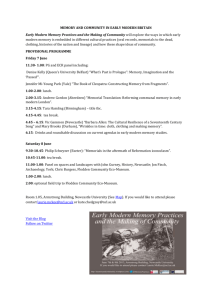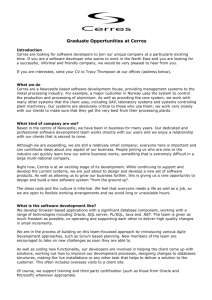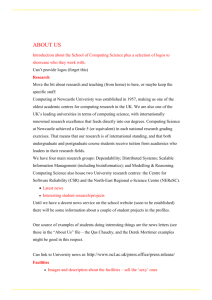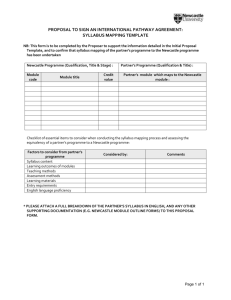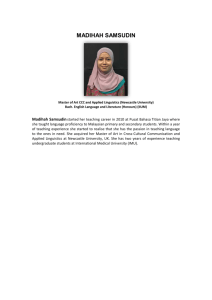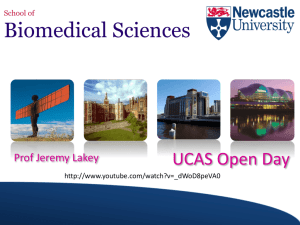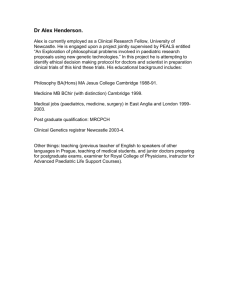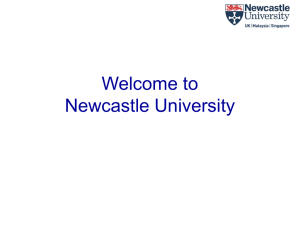PowerPointPresentati..
advertisement
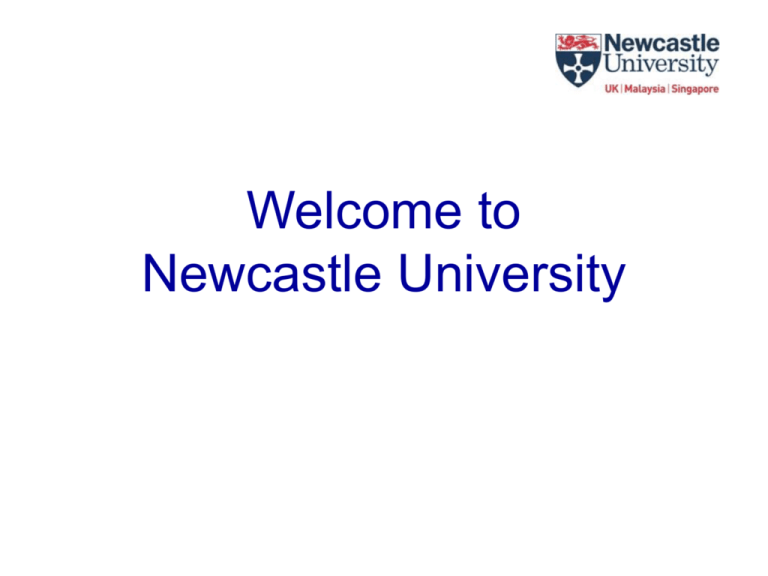
Welcome to Newcastle University Welcome and Introduction to the Programme Linda Robinson Staff Development Manager Programme • • • • • • • • • • Welcome and Introduction Vision 2021 and the way ahead Strategic Objectives – Counting What Matters Coffee Organisation, Structure and Governance or Who Runs Your University? Human Resources at Newcastle University Staff Development Opportunities Professional Association/Trade Union Representation Lunch – Close Tour of campus (optional) Questions to answer 1 2 3 4 What is the University’s core business? Who are its key senior people? How is the University organised and governed? What are the University’s policies on employment-related matters? 5 What opportunities will be available to you for development and training? Thank you Vision 2021 and the way ahead Professor Chris Brink Vice-Chancellor 13 March 2013 http://www.ncl.ac.uk/documents/vision2021.pdf Our Mission: • • • To be a world-class researchintensive university To deliver teaching and facilitate learning of the highest quality To play a leading role in the economic, social and cultural development of the North East of England Our Core Functions: • Research & Innovation • Learning & Teaching • Engagement Different ways of looking at the University By Faculty By Core Function Regional/National/ International Corporately Or… 9 See the University in terms of two questions What are we good at? What are we good for? 10 Civic University • We engage with civil society through the deployment of our research and teaching • We focus on o The supply side of the knowledge economy: knowledge creation o The demand side of the knowledge economy: tackling societal challenges • Our societal challenge themes: o Ageing o Social Renewal o Sustainability • We play a key role in the economic, social and cultural development of the North East. Societal Challenge Themes Excellence Medical Sciences Science, Agriculture & Engineering Humanities & Social Sciences (Faculties) Ageing Sustainability Social Renewal Purpose (Addressing Societal Challenges ) World Class • Ranked in the top 200 world universities by both QS and Times Higher Education. • 18th nationally in the Sunday Times/Times Good University Guide. • Voted one of best places to work in the Times Higher Best University Workplace Survey 2014. • Placed 10th in the UK for student satisfaction. Research Excellence • A member of the Russell Group, the association of the 24 leading researchintensive UK universities. • Ranked 17th in the UK for research power (Research Fortnight). • Holding one of the largest European Union research portfolios in the UK. • Specific research strengths in Bacterial Cell Biology, Civil Engineering, Computing: Human-digital interaction, Geography/Planning , Geriatrics and Gerontology, Hepatology, Neuroscience, Rheumatology, Urban Studies. Facts and Figures • Students, Academic Year 2013-14: o 16,872 Undergraduates o 6,002 Postgraduates Non-UK 29% Non-EU 22% • Employing 5,429 staff (UK, Malaysia and Singapore) • Awarding 4,133 Undergraduate and 3,774 Postgraduate degrees in 2012-13 • Generating £405.3 million in income (end of July 2013) • Over £120 million in research income • Two overseas campuses: NUMed Malaysia and NUIS Singapore Institutional Objectives (And keeping track) • Top 20 in the UK for research • Top 20 in the UK for student satisfaction • Focus on three societal challenge themes: – Ageing – Social Renewal – Sustainability • A significant international, national and regional profile and reputation • Financial and environmental sustainability For each objective, what are our KPIs? E.g: • Research income / FTE • Citations • PhD graduations / FTE For each KPI, what is the target? E.g: • ≥ Russell Group median Core function and Faculty objectives • Research Objectives • Learning and Teaching Objectives • Engagement and Internationalisation Objectives • Medical Sciences Objectives • HaSS Objectives • SAgE Objectives Each set of objectives is followed by KPIs and Targets Conclusion We have a good base: – Strong academic reputation – A clear sense of identity – Great student experience in a great city – International footprint – Growing student and staff numbers – Healthy financial position But the competition is strong, and our ambition is high ... - There’s a lot of work to do Thank you, and welcome Newcastle University’s Strategic Objectives Counting What Matters Steve Frater Director of Planning 20 Newcastle University 2013/14 Total Student Population 22,874 Diversity & Balance Changing Market? SAgE 7,126, 31% FMS 4,981, 22% HaSS 10,767, 47% About 5,000 staff > 120 Countries China 26% Singapore 10% Malaysia 8% India 4% Nigeria 3% Greece 3% UG 74% Academic Incubator PGR 8% Part Time 1,544, 7% PGT 18% O/S 26% GB 67% Other EU 7% Diversity Institutional Objectives Top 20 in UK for Research Top 20 in UK for Student Satisfaction Focus on Three Selected Societal Challenge Themes Significant International, National and Regional Profile Financial and Environmental Sustainability Where do we fit in? 1. Top 20 in the UK for Research What do we focus on? • Being Research Intensive Research Strategies in all Schools Focus on prestige publications Research Informed teaching • It’s expensive & competitive Average income per academic staff member Total Research income trends Regional and national comparisons • National Assessment Process Research Excellence Framework Currently 27th Quality. 17th Power • What is it good for? Impact Benefit to society Citations News Patents Spin out companies Cash Reputation Commerce 1. Top 20 in the UK for Research How Good ? Research Assessment Exercise 2008 Newcastle - % 3* + % 4* 100 90 80 % 3* plus % 4* 70 60 50 40 30 20 10 0 Various UoAs In 26 of 38 Units of Assessment ≥ 50% = internationally excellent or world leading 1. Top 20 in the UK for Research Ageing and Health The Fusion of Arts, Science, Culture and Heritage Cancer Cell and Molecular Biology Computing and Software Reliability Engineering Biology Digital Media System Biology and Molecular Agriculture Engineering Design The Environment, Sustainability and Earth Systems Gender and Woman’s Studies Ethics Life Sciences Health Services Research Human Genetics Language and Linguistics Marine Engineering Nanotechnology Public Policy Stem Cells Energy Informatics Chemical Processing Medical Imaging Music Neurosciences – Psychology, Brain and Behaviour The Rural Economy Sensors, Biosensors and Electronics Urban and Regional Development Water Research Grants & Contracts Income NE Universities - Research Grants & Contracts Income £k 100000 90000 80000 70000 60000 50000 40000 30000 20000 10000 0 2002/03 2003/04 2004/05 2005/06 2006/07 2007/08 2008/09 2009/10 2010/11 2011/12 2012/13 Durham Newcastle Northumbria Sunderland Teesside 2. Top 20 in the UK for student satisfaction What do we focus on? • Entry Standards (AAB in 2012, ABB in 2013-2015) • Widening Participation - Low Participation Neighbourhoods, Social Groups • Attendance • Internal Surveys • National assessment processes - Quality Assurance - Student Survey (National Student Survey NSS – 90% target) • Employability - Overall - Graduate level jobs in Times league table • Post Graduate Student numbers & Satisfaction Surveys • Post Graduate Research Degree Completion rates 2. 90% institutional minimum for student satisfaction 23 Questions in 7 areas • Teaching on my course • Assessment and feedback • Academic support • Organisation and management • Learning Resources • Personal Development • Overall Satisfaction 2013 - 90% (89% last year) (Sector 86%) 10th= nationally 4th= out of 24 in Russell Group Issues ? • We have an objective of 90% on Overall Satisfaction 90% in 30 subjects, out of 48 Success • Assessment and feedback – 70% (up from 67%. Sector average - 72%) • Ability to access general IT resources - 92% (up from 86%. Sector - 87%) 2. 90% institutional minimum for student satisfaction How did you do in 2013 ? 100% 90% 80% 70% 60% 50% 40% 30% 20% 10% 0% Overall Satisfaction % 3. Focussed on 3 Societal Challenge Themes What do we focus on? • One theme launched for each of three years. Then ongoing. • Expertise at Newcastle • Global interest, local resonance • Public Engagement • Led by a Faculty, • • • but multi disciplinary. Ageing Sustainability Social Renewal • Broad Staff commitment - Not just a few research stars • Outputs – Debates, Conference, Lectures, Presentations, Competitions, Alumni engagement, Commercial engagement • Societal impact. Themes that affect us all 4. A Significant International Profile What do we focus on? • Strategic PartnersGroningen (Netherlands) Monash (Melbourne, Australia) (Medical Research, Joint PG Degrees, Academic & Student Exchanges) • In Country Delivery Numed Malaysia Medical Campus Singapore Institute of Technology Chemical Engineering Food and Human Nutrition Marine Engineering, Offshore Engineering and Naval Architecture Mechanical Design and Manufacturing Engineering • International student body • International Citations - Which Newcastle? • International Employers Partnerships & In Country Delivery Newcastle University ? NUMed Campus Nusajaya, Malaysia Singapore Institute of Technology Singapore Partnerships European Student Exchange programmes Newcastle University Student Exchange 4. Engagement (Regional, National, International) • Where our Teaching and Research impacts on our civic responsibility • Working with local stakeholders City Council, Newcastle/Gateshead Initiative, Newcastle Science City Science Central Local Enterprise Partnership City & regionally based organisations (e.g. Lit. & Phil, faith communities) Sage Gateshead • Offer what we have. Museums: Great North Museum : Hancock Hatton Gallery Public Lectures - Insights Concerts Northern Stage New Writing North Newcastle University 5. Financial and Environmental Sustainability Total Income 2012/13 £405m £m Research Grants, £86m, 23% ? ? Other Sources, £67m, 18% Interest on Cash & Investments, £5m, 1% UK Government, £106m, 28% Where does our Income come from and where is it spent? Total Expenditure 2012/13 £389m Depreciation, £10m, 3% £m Student Fees, £116m, 30% Other operating costs, £151m, 41% Staff Costs, £210m, 56% Interest Payable, £1m, 0% 5. Environmental Sustainability Operational Challenging Government targets on carbon reduction Recent achievements include; • Recycling rate now over 90%. • 18% reduction in car usage, since 2004 14% increase in public transport usage to travel to work. • Trial of electric cars and charging points on campus. • Biodiversity projects, including reduction of pesticide / herbicide use and creation of allotments, woodland corridors and wildlife friendly areas. Plant and wildlife walks. • Platinum EcoCampus award (2012) (The leading Environmental Management System and Award Scheme for the Higher and Further Education sectors) • Extensive staff, student and community engagement Find out more - Get Involved - Become an Environmental Coordinator www.ncl.ac.uk/saveit 5. Environmental Sustainability Research Newcastle University’s second societal challenge theme is Sustainability. The Newcastle Institute for Research on Sustainability NIReS aims to bring people together to develop sustainable responses to the great challenges of our age: ensuring that everyone has access to a fair share of the world’s resources in perpetuity. For more information, please visit; www.ncl.ac.uk/sustainability Enough, for all, forever. Summary • • • • • • Newcastle University is one of the 24 Universities in the Russell Group Large and growing student population Large employer (3rd largest based on Tyneside ?) Income as big as Manchester United (but without the enormous debt) Offer a very broad range of educational opportunities World-class reputation for research excellence: – spearheading three major societal challenges with impact on global society. • Ageing • Sustainability • Social Renewal • Research income 50% more than the other 4 universities in the North East combined • We ranked 18th in The Times/Sunday Times 2014 Survey published 2013 • Amongst our peers, in 2013 Newcastle ranked: – 5th in the UK for employability of its graduates – 10th in the UK for student satisfaction • First UK university to establish a fully owned international branch campus for medicine. NUMed Malaysia - opened 2011 Doing well against Strategic Objectives, … but will do better • The Cultural offer Public Lectures - a programme to inform, stimulate, entertain, and excite debate http://www.ncl.ac.uk/events/public-lectures/ Great North Museum : Hancock - Free entry and great for all ages (now houses all the 3 University museums) http://www.twmuseums.org.uk/great-north-museum.html Hatton Gallery - Free entry http://www.twmuseums.org.uk/hatton-gallery.html Northern Stage - great theatre on campus http://www.northernstage.co.uk/ Newcastle Centre for the Literary Arts - programme of events open to all http://www.ncl.ac.uk/ncla/ Thank you 41 Newcastle University, Organisation, Structure and Governance or Who Runs Your University? Dr John Hogan Registrar Governance structures at the Newcastle University • • • • • • • 1963 Act of Parliament Court – large body, external facing, lay majority Council – the supreme governing body Senate – the supreme governing and executive body in all academic matters Academic Board – all academic and equivalent staff Convocation – all graduates Faculties – schools/institutes Academic Structure 3 Faculties Humanities & Social Sciences Medical Sciences Science, Agriculture & Engineering Schools, Research Institutes and Centres Pro-Vice-Chancellors for Faculties Deans – Postgraduate, Undergraduate, Research (and Business Development, International, Clinical Medicine) Heads of Schools/Institutes Professional Support Services • • • • • • • • • • Academic Services Corporate Affairs Estate Support Service Finance and Planning Human Resources Internal Audit NUIT Research and Enterprise Services Faculty Support Teams Student Services Council • Governing body of the University • Responsible for University finances • Formally accountable for all aspects of • • • the University including its overall performance and the propriety of its operations Up to 25 members Lay majority Chair - a lay member Senate • Supreme authority on academic matters • Responsible for regulating and directing • • the academic work of the University Up to 36 members – majority elected Chair - Vice-Chancellor Lay Officers • • Chancellor – Sir Liam Donaldson Chair of Council and ProChancellor – Mark I’Anson • • Vice-Chair of Council – Jacqui Henderson Honorary Treasurer – Stephen Lightley Senior Management Team Vice-Chancellor – Professor Chris Brink Deputy Vice-Chancellor – Professor Ella Ritchie Pro-Vice-Chancellor Medical Sciences – Professor Chris Day Pro-Vice-Chancellor Planning & Resources – Professor Tony Stevenson Pro-Vice-Chancellor Science, Agriculture & Engineering – Professor Steve Homans Pro-Vice-Chancellor Learning & Teaching – Professor Suzanne Cholerton Registrar – Dr John Hogan Pro-Vice-Chancellor Research & Innovation – Professor Nick Wright Executive Director of Finance – Mr Richard Dale Pro-Vice-Chancellor Humanities and Social Sciences – Professor Charles Harvey Executive Director of Human Resources - Mrs Veryan Johnston Executive Board • Overseeing management of the University’s • • • business and the communication and implementation of its strategies. Monitoring the academic and financial performance of all budgetary units and the University as a whole. Evaluation of academic and business opportunities and proposals for major new initiatives. Determining the University’s annual budgetary allocations. Executive Board Agenda, 11 March 2014 1. Health and Safety 2. Neptune Centre 3. Armstrong Building Redevelopment 4. English Language Policy 5. N8 Future Strategy 6. Undergraduate applications report 7. Postgraduate applications report How do I find out? • https://my.ncl.ac.uk/staff/ Thank you 53 Human Resources Garry Coupland Assistant Director of Human Resources 54 HR Strategic Objectives 1. Be a great place to work with employees committed to University objectives and valued for their contribution – – 2. Reward and Recognition Communication Improve the profile and performance of the University by recruiting and developing high calibre employees with appropriate external recognition – – Recruitment and Selection Induction 55 HR Strategic Objectives 3. Develop a high performance culture in which delivery to agreed standards and objectives is the norm – Performance and Development Review – Training and Development 4. Develop an efficient, effective and sustainable employment environment – Competitive cost effective employment package – Flexible working practices 56 HR Strategic Objectives 5.Promote diversity, flexibility and innovation by developing organisational capability and culture − Culture of dignity and respect − Leadership Development 6.Promote a safe and healthy environment in which students and staff take a proactive approach to their own health and safety − Workplace Wellbeing − Safety first 57 What can you expect from us? • • • • • Contract Communication Development and Career Progression Safe and healthy environment Benefits • Pensions • Facilities, e.g. Library, sports • NU Options 58 What do we need from you? • • • • Tell us what you think and what you need Be an ambassador Share your skills, knowledge, experience Be positive and constructive 59 Thank you 60 Welcome and Introduction to the Programme Linda Robinson Staff Development Manager Staff Development Unit • • • • • • • University-wide role Staff development opportunities How do we do this? Learning Resource Centre Future plans Staffing Location Staff Development Unit “The SDU is here to anticipate, identify and fulfil the development potential of our University. We work collaboratively at an individual and organisational level to enable continuing achievement of the University’s Mission.” University-wide Role • • • • • • Development opportunities for all staff Advisory service for Managers Personal and Management Development IT Training CPD for Academic Staff and Research Staff Leadership & Management Development Opportunities How do we do this? • Tailor-made development activities for individuals, academic/service units • A comprehensive Open Programme • One to one coaching/mentoring, development centres • Development Programmes e.g. Principal Investigator (PI) programme, NewStart programme, HASS faculty futures, NU Professors • Career Pathways Framework and advice for Research Staff • Accredited Programmes e.g. CASAP, NTA, SSSDP • Vocational Qualifications – ECDL, MOS Open Programme • Motivating Staff in Challenging Times • Events Planning & Management • Maximising your Memory • Self-hypnosis and Stress Management • Microsoft Office application training e.g. Word, Excel, Outlook • EndNote, SPSS • Strategies for Research Success • Academic Writing • Presentation Skills • Getting the most from your PDR • The Essentials of Project Management • Moving Mountains – (Influencing & Persuading) • Building Personal Impact • Time Management • Research Supervision • The Role of the Degree Programme Director • Four steps to (Research) independence • An Introduction to Current Teaching Room Technology Learning Resource Centre • • • • LRC in the Staff Development Unit Over 600 Resources available to staff PDR online film Web based learning materials – IT – Personal development http://www.ncl.ac.uk/staffdev/lrc/ Current and planned projects • Leadership Succession Planning • Developing leaders to work internationally • Faculty Futures Development Programme for early career academic staff • Designing e-learning materials • Chameleon Management Development Programme • Production of Effective Performance Conversations online video • Enhancing digital literacy skills • ‘Spotlight On’ series • Future Planning Event QuILT (Current and planned projects and services) • Support for learning & teaching development – – – – • Co-ordinating projects and initiatives on chosen institutional themes, such as assessment and feedback, personal tutoring and research-informed teaching Co-ordinating funding for learning and teaching innovation Supporting reward and recognition of excellence, including Vice-Chancellor’s Teaching Awards and National Teaching Fellowships Disseminating good practice through communities, events and case studies Support for the use of University-supported e-learning tools Including the Blackboard VLE, ReCap lecture capture, e-portfolios, student response system, eassessment and feedback • Quality assurance of new and existing programmes Developing policy, and providing advice on and support for implementation • Support for student engagement Gathering student opinion through module evaluation, National Student Survey, Postgraduate Research Evaluation Survey, International Student Barometer, Postgraduate Taught Evaluation Survey, maintaining You Said, We Did webpages, and working with the Students’ Union on the implementation of the framework for student representation • Support for external initiatives in learning and teaching Advising on the development of educational partnerships, partnerships and bids http://www.ncl.ac.uk/quilt/ How to find us Staff Development Unit, Ground Floor, King George VI Building, Newcastle upon Tyne Telephone enquiries to extension 7872 RVI Hospital Queen Victoria Road St Thomas Street * Staff Development Unit Kings Road Hotspur Public House Oxfam Shop Percy Street Marks and Spencer Thank you 71 Welcome to Newcastle! Why join UCU ? • Benefits to you • Benefits to all staff • TOGETHER WE CAN IMPROVE! • Our democratic, non-political, employee union • Members are academic, research and senior administrative staff in all areas of the University UCU: who we are UCU represents academic and professional staff in further and higher education: Lecturers and professors Tutors and researchers Senior professional staff and managers Admin, library and computing staff (at Grade F and above) What does UCU do? • UCU is the national voice of academic and related staff across the HE sector. It negotiates on your behalf at both national and local level • Offers a range of member services: • Support, advice, representation, training and forums • For example, UCU provides individual case support with expert advice, negotiation with management and with legal backing UCU: why have a union? UCU acts as an ex officio professional body communicating with the government on higher education matters Defending access to public education Making the case for more funding for education Lobbying for greater status and professional support for educators Campaigning on your behalf Locally: • Are talking to the university about working hours/workload and stress • Take part in meetings on all sorts of issues affecting staff • Working hard to prevent redundancy • Continually talking to the University about the casualisation of staff on fractional or short term contracts Casework The most likely reason you will need the union locally is if you find yourself in difficulty at work We can provide advice, support and in the most serious cases legal assistance Who are UCU at Newcastle ? • President : Dr Joan Harvey • Vice Presidents : Prof Colin Brooks, Dr James Babb • Secretary : Gill Paczynski plus 3 more officers and 9 committee members • A network of Local Reps in Schools/Institutes/ Services • Branch Administrator : Jane Blakeman Join today here: http://www.ucu.org.uk/join Subscription: for a full-time member of staff is around £23 per month – tax deductible! Contact us in person at: 10 Eldon Place, 1st floor: By telephone on Ext. 6734 – Jane Blakeman, Chris Easton By e-mail: ucu.office@ncl.ac.uk UNISON [floor 2] and UNITE [floor 1] are also at 10 Eldon Place Thank you for your attention
